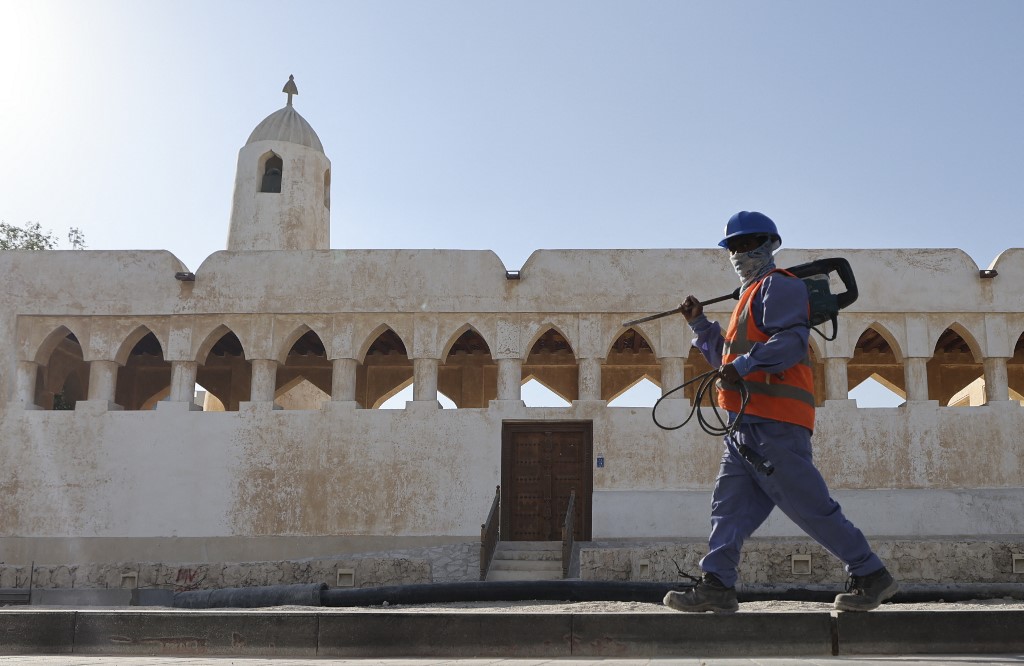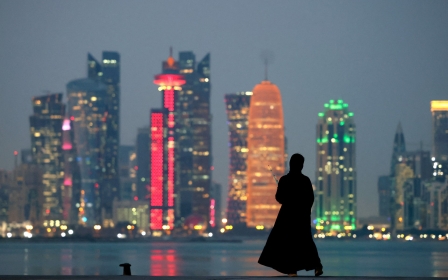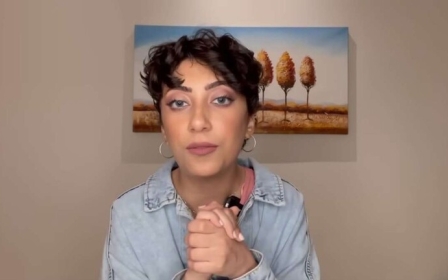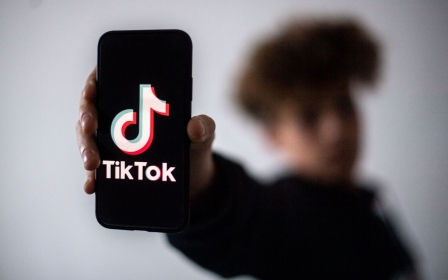Dissent, fame and vlogs: Qatar's migrant workers find their voices on TikTok
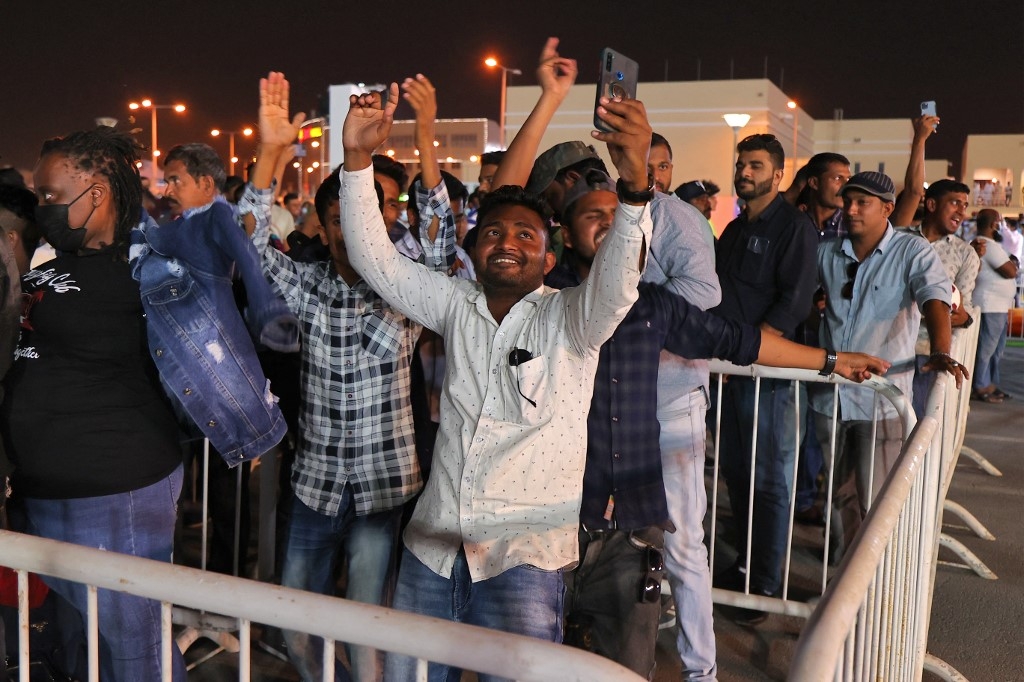
"There's nothing wrong being khadama," writes TikTok user jofaaw in a video caption, using the Arabic word for maid. "We are human like you, we are workers, not a slave."
The Qatar-based worker was commenting on another video in which a woman was complaining about domestic workers' excessive use of TikTok on the Kuwaiti channel aloula.24.
"Ya Allah madam!!! You think khadama don't have right using social media, because you are treating khadama like animals!!! we are human, we are workers not a slave, when we die God not separate madam and khadama!!!!", jofaaw's text on the video read.
'We are human, we are workers not a slave'
- TikTok user jofaaw
The Filipina national is one of the countless foreign workers in Qatar who have found their voice on TikTok.
The Chinese short-form video app has quickly become the main medium of expression for the working class in the Gulf nation, where migrant workers make up almost 90 percent of its population of nearly three million people.
New MEE newsletter: Jerusalem Dispatch
Sign up to get the latest insights and analysis on Israel-Palestine, alongside Turkey Unpacked and other MEE newsletters
Away from government control and public scrutiny, a TikTok user will see almost everything that shapes the life of an expatriate in Doha on the app. In short clips, one can encounter the good, the bad and the ugly, from happy success stories to angry labour protests.
Dissent
In one video posted in May last year, a group of security workers are seen holding a strike over salary cuts.
Another video, taken in February, shows a man speaking in Hindi encouraging workers with the UrbaCon Trading & Contracting Company (UCC) to demand their rights. In the same month, labourers posted videos of them striking against the construction company.
According to local outlet Doha News, the protests were held after the company extended working hours for employees and removed the Friday day off so as to finish the World Cup projects "on time".
The company said working overtime is offered and compensated "in accordance with the Labour law".
In August, dozens of workers were deported after taking part in a rare protest for unpaid and delayed wages owed to them by another Doha-based firm, Al Bandary Engineering and Electrowatt Co.
Despite making strides in labour reforms ahead of the World Cup, set to start in Doha later this year, migrant workers in Qatar are still banned from joining trade unions and taking strike action.
Fearing dismissals and deportations, migrant workers rarely go on strike to protest against poor working conditions, unpaid and delayed wages, and threats of reduced salaries.
According to a Qatari security source, who spoke to MEE on condition of anonymity, almost every recent labour protest in Qatar first appeared on TikTok, highlighting the importance of the app in bringing attention to the workers' plight.
"But they are featured in a way that is too silly, set to Bollywood songs and dialogues, with slow-motion editing," he said.
The app is also used to raise awareness about the treatment of domestic workers by their employers.
User jofaaw, commenting on another video by aloula.24 channel, is jubilant when a man is speaking about the role of maids in a positive light.
"A real Muslim has always good heart!!!! Allah bless you baba," the caption read.
Zahra Al Anssari, a Qatari TikTok influencer, said these videos are a good way to expose Qataris to the struggles of migrant workers in their own country. "It's a good way to spread awareness," Al Anssari told MEE.
'You'll find everything on TikTok'
While some influencers thrive on the platform, for most users in Qatar, TikTok posts are their version of diary entries.
MEE's analysis of around 400 videos and interviews with a dozen expatriate users shows a flourishing of subcultures, identities and dialects, often incomprehensible to outsiders.
More often than not it will be housemaids, delivery drivers and nurses sharing their daily affairs, from mall visits to dhow cruises and labour day celebrations.
A shot taken from Doha's Old Airport Road shows a Qatar Airways aeroplane flying low to the sound of a track of a Pashto song longing for home.
Users scrolling through videos will even find items and services to purchase.
"You'll find everything on TikTok, from sex workers to knock-off products," a health ministry official, who once bought a luxury-looking wristwatch based on a TikTok recommendation, told MEE.
Start.io, a mobile marketing and audience firm, says Qatar's TikTok audience size is just short of half a million, meaning every sixth person can be influenced by TikTok, with 72.7 percent being in the 25-34 age group.
The growth of TikTok in Qatar is in line with the app's rapid rise in the Gulf region, especially in Saudi Arabia and the United Arab Emirates, where it's most popular.
In the past year, the follower count of three influencers in Qatar jumped by 658 percent. This is despite an official apathy towards engaging on the platform, with ministries and departments staying off the app.
Fame
Hafis Ashraf admits he has become a TikTok addict. For the Indian IT support worker, his video stunts on the app are more than just about vlogging or raising awareness. They're the gateway to his dream of becoming a full-time actor.
"I don't have many industry connections; TikTok helps me showcase my skills," the 31-year-old, who has more than 13,000 followers, told MEE. His mimicking of Indian action heroes in short snappy videos has already earned him a role in a low-budget short film.
But he is hoping for more, as he improves his video production and publication strategy, posting only three videos a week and using movie-like camera angles and effects.
'I'm on TikTok because of my passion for acting. I find happiness when people appreciate it'
- Hafis Ashraf, IT support worker
"I'm on TikTok because of my passion for acting. I find happiness when people appreciate it," he says.
Ashraf's dream is not far-fetched.
Rasool Kareem, 35, has gone down a similar path, starting his journey as a family driver to becoming a TikTok superstar with more than 4.3m followers, the largest in Qatar.
His creative video storytelling has earned him acting roles in local commercials for McDonald's, KFC, football governing body Fifa, Ooredoo telecommunications and QNB bank.
After a short stint as a domestic worker in Qatar between 2007 and 2011, Kareem returned to his home town in India's movie-obsessed Tamil Nadu state. There, he sought his dream of becoming an actor but managed to play only small roles.
He returned to Qatar in December 2012 under a new employer, who one day saw him scrolling through his previous movie clips on YouTube.
"He said if acting is my passion, he will give me a chance. I then danced to an Arabic rap on his Snapchat account, which went viral," Kareem told MEE.
His journey to stardom started then. At first, he made a lot of comedy videos criticising racism in Qatar, which was not always warmly welcomed.
"There were angry comments 'like how can an Indian worker criticise Qataris?' But over time, people began appreciating me."
After leaving his job as a family driver to be a full-time influencer, Kareem now gets hired to do paid promotions for companies across social media platforms. How much money he makes is not something he wishes to share.
But according to a restaurant co-manager, who preferred not to give his name, hiring TikTok influencers for marketing can cost between $130-$680 per promotion, depending on follower size.
It is much more affordable compared to Instagram influencers, he said.
"[TikTok influencers] lack the sophistication of Instagram influencers, but it's a reliable way of targeting low-income users."
Middle East Eye delivers independent and unrivalled coverage and analysis of the Middle East, North Africa and beyond. To learn more about republishing this content and the associated fees, please fill out this form. More about MEE can be found here.


